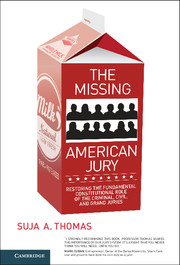 The Missing American Jury
The Missing American Jury 3 - The Missing Branch
from PART I - The Jury Now
Published online by Cambridge University Press: 05 June 2016
Summary
As described in Chapter 2, the criminal, civil, and grand juries have declined in authority from their late eighteenth-century English roots. Yet, the executive, the legislature, the judiciary, and the states have gained power. Though attempts have been made to explain the jury's diminution, the corresponding rise of these other bodies has never been acknowledged. This chapter introduces a theory accounting for the fall of the three juries and the related increase in authority of these three branches of government and the states.
Reasons Proffered for the Falls of the Criminal, Civil, and Grand Juries
Commentators generally do not recognize the similarity of the reasons proffered for the criminal, civil, and grand juries’ declines. However, cost, incompetence, inaccuracy, and inefficiency are commonly touted as explanations for why all three juries hear few cases, and why, even when they do hear cases, their authority may be disregarded.
The Criminal Jury
Much of the decline of the criminal jury in the United States is attributed to plea bargaining. Its systematic use first occurs in the early nineteenth century. While defendants pled to different crimes at various rates, it appears that they generally pled guilty only about 20% of the time. By the early twentieth century, the proportion of defendants who took pleas grew to more than 90% – a figure that continues to climb.
Different reasons have been offered for the increase in plea bargaining and subsequent decrease in jury trials. The rise in the number of plea-bargained cases has been associated with changing caseloads. As the absolute number of criminal defendants has increased over time – for example, doubling in the federal courts from 1946 to 2002 – some argue that pleas have become necessary to dispose of cases quickly without trial. Faced with heavy loads, prosecutors and judges alike have similar incentives for plea bargaining. In the 1970s, the Supreme Court's Chief Justice Warren Burger stated that “plea bargaining is to be encouraged because ‘[i]f every criminal charge were subjected to a full-scale trial, the States and the Federal Government would need to multiply by many times the number of judges and court facilities.’” Or, as John Langbein translates Burger's sentiment, “[w]e cannot afford the Constitution and the Bill of Rights. Sheer expediency is rationale enough for disregarding the constitutional texts.”
- Type
- Chapter
- Information
- The Missing American JuryRestoring the Fundamental Constitutional Role of the Criminal, Civil, and Grand Juries, pp. 49 - 106Publisher: Cambridge University PressPrint publication year: 2016


